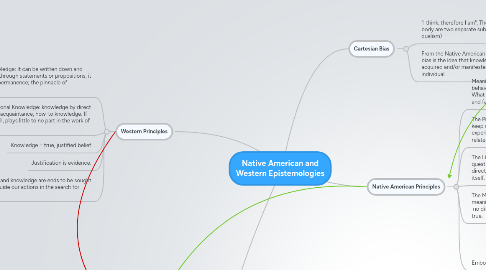
1. Western Principles
1.1. Propositional Knowledge: It can be written down and directly conveyed through statements or propositions, it is though to have permanence; the pinnacle of philosophy.
1.2. Non Propositional Knowledge: knowledge by direct awareness or acquaintance, how-to knowledge. If accepted at all, plays little to no part in the work of philosophy.
1.3. Knowledge = true, justified belief
1.4. Justification is evidence.
1.5. Truth and knowledge are ends to be sought and guide our actions in the search for them
2. Phenomenology
2.1. Two Attitudes
2.1.1. 1. Natural Attitude: the way we are ordinarily taken up with the various things in this world (walking down the streets, talking to friends, going to work).
2.1.2. 2. Phenomenological Attitude: disengaging from the natural attitude and focusing on all that is in the natural attitude in order to reflect upon it. In this reflection all experiences count as data to be understood, all phenomena must be accounted for.
2.1.2.1. From this perspective we describe all the particular intentionalities of the Natural Attitude in order to understand the world and our place in it.
3. Native American Principles
3.1. Meaning-Shaping Principle of Action: How we behave shapes meaning, gives shape to the world. What we do, how we act, is as important as any truth and fact.
3.2. The Principle of Relatedness: The most important things to keep in mind are the simple things directly around us in our experience and the things to which we are most directly related.
3.3. The Limits of Questioning: The way we ask questions guides us, to the right answer. What is true directs the method of questioning and the question itself.
3.4. The Moral Universe Principle: Facts, truth, meaning, our existence, are normative. There is no difference between what is right and what is true.
3.5. Embodied Knowledge
3.5.1. Knowledge gained from experience, knowledge we carry with us that allows us to function the world, to carry on daily tasks and live our lives. "Lived Knowledge" needs no justification.
3.5.2. Knowledge is shaped and guided by human actions, endeavors, desires, and goals. it is put to use and can never be divorced from human action and experience. It is concerned with what is in front of us and at our feet.
4. Cartesian Bias
4.1. "I think, therefore I am". The notion that mind and body are two separate substances (mind/body dualism)
4.2. From the Native American perspective the real bias is the idea that knowledge can only be acquired and/or manifested in or by an individual.
4.2.1. "We are, therefore, I am." Understanding must include all experiences, not simply one's own.
